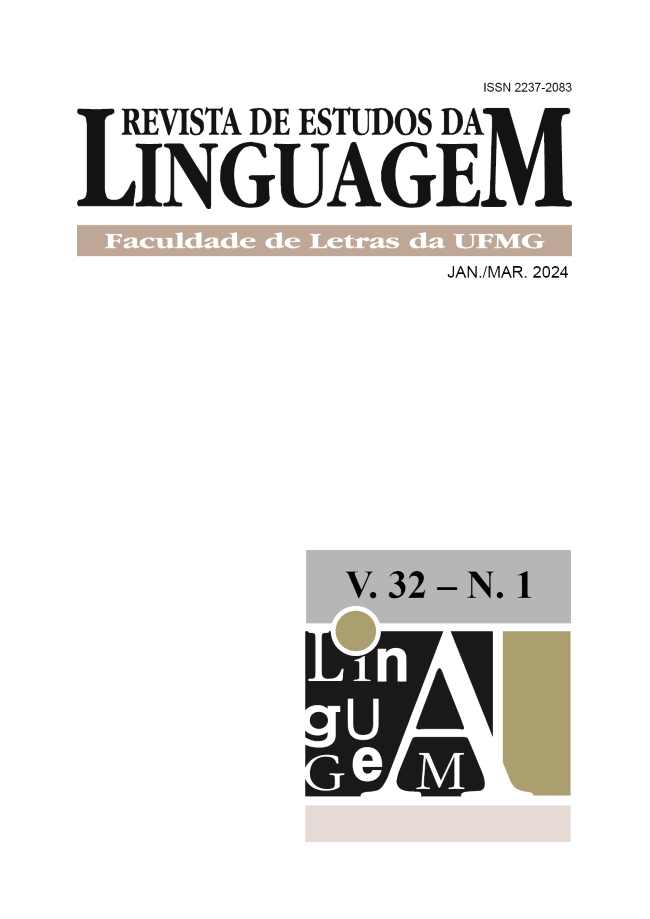Argument Coreference Between Content Verbs and Predicative Nouns in Brazilian Portuguese
A Pilot Corpus Study
DOI:
https://doi.org/10.17851/2237-2083.32.1.260-288Keywords:
predicative noun, coreference, support verb, light verb, coercionAbstract
The literature on complement clauses and support/light verb constructions provides most of the available information on coreference between arguments of matrix and subordinate syntactic predicates. However, this phenomenon is largely unexplored when it comes to verb phrases consisting of a content verb and a predicative noun in object position, such as declarar paixão (“declare passion”), cumprir a promessa (“fulfill the promise”), responder perguntas (“answer questions”), or resistir à tentação (“resist temptation”). The notions of obligatory and non-obligatory coreference do not fully explain this phenomenon, since non-coreferential usage of these phrases leads to different types of coercion, which are relevant properties to classify these phrases. This paper proposes a pilot study of verb phrases of this kind, extracting them from a Brazilian Portuguese newspaper corpus aiming at their syntactic-semantic classification. This procedure revealed a total of 75 such verb phrases. Based on semantic coercion and distributional properties, four major classes divided into seven subclasses are proposed to cover two-thirds of the data. There is also a fifth class with 17 items in which coreference appears to be a contextual property, i.e., unrelated to lexical semantics, and eight hapax legomena. The results provide a new perspective on this understudied topic, identifying also irregular aspects deserving further studies
Downloads
References
AFONSO, S.; BICK, E.; HABER, R; SANTOS, D. Floresta sintá(c)tica: a treebank for Portuguese. RODRIGUES, M.; ARAUJO, C. (Org.) Proceedings of the Third International Conference on Language Resources and Evaluation (Las Palmas de Gran Canaria Espanha, 29-31 de Maio de 2002), Paris: ELRA, 2002.
ALBA-SALAS, J. Subject control into nominals in Romance. SKY journal of linguistics, v. 19, p. 9-62, 2006.
BARROS, C. Descrição e classificação de predicados nominais com o verbo-suporte fazer no Português do Brasil. Doctoral thesis. São Carlos: Universidade Federal de São Carlos, Programa de Pós-graduação em linguística, 2014.
BRUENING, B. Light verbs are just regular verbs. University of Pennsylvania Working Papers in Linguistics, v. 22, n. 1, p. 7, 2016.
BUTT, M. The light verb jungle: Still hacking away. AMBERBER, M.; BAKER, B (Ed.), Complex predicates in cross-linguistic perspective, Cambridge: Cambridge University Press, p. 48-78, 2010.
CALCIA, N. “Este foi outro aspecto que sofreu uma avaliação positiva”: as construções conversas fazer-sofrer, Estudos Linguísticos, v. 52, n. 2, p. 579-594, 2022.
FOTOPOULOU, A.; LAPORTE, E.; NAKAMURA, T. Where Do Aspectual Variants of Light Verb Constructions Belong? Proceedings of the 17th Workshop on Multiword Expressions, p. 2-12, 2021.
GROSS, G. Les constructions converses du français. Langue et cultures, 22. Travaux du Laboratoire de Linguistique Informatique. Librairie Droz: Genève Paris, 1989.
GROSS, M. Méthodes en syntaxe: régime des constructions complétives. Paris: Hermann, 1975.
GROSS, M. Les bases empiriques de la notion de prédicat sémantique. Langages, n. 63, p. 7–52, 1981.
GROSS, M. La fonction sémantique des verbes supports. Travaux de Linguistique, v. 37, n. 1, p. 25-46, 1998.
LAPORTE, E. Exemplos atestados e exemplos construídos na prática do léxico-gramática. Revista (Con)textos Lingüísticos, v. 2, p. 26-51, 2008.
MEL’ČUK, I. Collocations and lexical functions. COWIE, A. (Ed.), Phraseology: Theory, analysis, and applications, Oxford: Oxford University Press, p. 23-53, 1998.
MEYERS, A; REEVES, R; MACLEOD, C. NP-external arguments: A study of argument sharing in English. Proceedings of the Workshop on Multiword Expressions: Integrating Processing, p. 96-103, 2004.
MOUROUNAS, M. Nominalisation and inherent control. Doctoral thesis, University College London, 2019.
PETRUCK, M.; ELLSWORTH, M. Representing support verbs in framenet. Proceedings of the 12th Workshop on Multiword Expressions, p. 72-77, 2016.
RASSI, A. O verbo dar em português brasileiro: descrição, classificação e processamento automático. Araraquara, SP: Letraria, 2023.
RODRIGUES, R.; PICOLI, L. O modelo do Léxico-Gramática no Brasil. Revista de Estudos da Linguagem, v. 27, n. 2, p. 885-910, 2019.
SAG, I.; BALDWIN, T.; BOND, F.; COPESTAKE, A.; FLICKINGER, D. Multiword expressions: A pain in the neck for NLP. International Conference on Intelligent Text Processing and Computational Linguistics, Berlin: Springer, p. 1-15, 2002.
SANTOS, M. Descrição dos predicados nominais com o verbo-suporte ‘ter’. Doctoral thesis, São Carlos: Universidade Federal de São Carlos, Programa de Pós-graduação em linguística, 2015.
SARDINHA, T. The Brazilian Corpus. AACL 2009 Abstract Book, Alberta, p. 30, 2009.
SAVARY, A. et al. The PARSEME shared task on automatic identification of verbal multiword expressions. Proceedings of the 13th Workshop on Multiword Expressions (MWE 2017), Valência, p. 31-47, 2017.




 Esta obra está licenciada com uma Licença
Esta obra está licenciada com uma Licença 